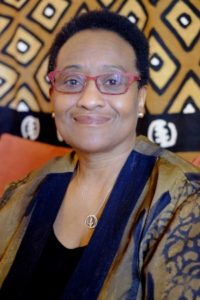Living the Resistance
We are all well aware of our dire national situation—we talk about it, and as a minister I have been preaching about it in venues all over the country. People across the political spectrum consider the election a major disruption to all that they know and have experienced. For some of us the recent electoral change has been less disruptive than for others, but all of us feel it. What hasn’t been as clear until recently, I think, is the ripple effect—the reality that one major disruptive event might lead to others. I believe we are being called to review—even disrupt—major institutions which, up to now, have connected and supported many of us, even as they have hurt and drained others.
That’s what’s happening in Unitarian Universalism right now. We have been presented with the gulf between what we say we believe and what we actually do, and the dissonance between the two is painful and dislocating. As people of faith, we know that, to some degree, this is part of the human condition. Our varied religious traditions are meant to help us acknowledge and close the gap between what our hearts long for and what they settle for. In these days, however, even our faith traditions disappoint us at the very moment we need them most.
The conversations going on in Unitarian Universalism right now about the power of white supremacy and white privilege to keep us separate from one another are real, painful, even dangerous. In particular, people of color and indigenous people who love our faith are risking their professional futures to speak out about how hard and how damaging it can be to keep faith with a religious tradition that has its roots in white supremacy. That is not an accusation; it is a fact. Our American Unitarian and Universalist past was built by people who believed in the superiority of European Americans to the exclusion of others, and who helped to create structures to support those beliefs.
We can’t change that past; we can only change our future together. Such an effort is underway right now, thanks to the courage of groups like Black Lives of Unitarian Universalism and other people of color and indigenous groups and their white allies. I am proud of all those at the UUA who have chosen to engage in this vital work, and especially grateful to Dr. Leon Spencer, as well as the Starr King graduates who have agreed to assume association leadership: Rev. Sofia Betancourt, (SKSM ’03); Rev. Bill Sinkford, (SKSM ’95); and Rev. Sarah Lammert (SKSM ’93). Thank you for your service to our faith at a disruptive time. You, as well as the UUA Board and staff, are in our prayers for courage and wisdom.
A similar sense of dissonance and disruption has made itself felt here at Starr King. Our school has spent the last 20+ years working to be a counter-oppressive theological seminary. We take seriously the struggle against white supremacy and the intersecting ways it works to oppress human beings. In some ways, we do an incredible job of sending ministers into the world ready to disrupt white supremacist culture. But in other ways, we fall short of our goal of educating to counter oppressions. That’s been my experience over the last six weeks or so. Some of our students have come to me with concerns about the ways their colleagues are being treated. Our executive team has heard from individual students, elected representatives of the student body, and our elected student trustees. In these conversations with us, students have spoken of the micro aggressions they’ve heard or personally experienced. They’ve felt diminished by seeing historic pictures of the school’s early founders, yet few pictures of people who look like them or inspire their work and their witness in our troubled world. They’ve wondered how they might find their way when a classroom sometimes feels like a place of disrespect and not a place of learning and engagement. In short, they have questions about whether we mean what we say. It grieves me that some of our students even have to ask that question. But it is a sign that white supremacy is relentless in its ability to resurface, even when we believe we are paying attention.
We here at the school must take up our work with new energy. Our executive team and faculty will revisit our current Educating to Counter Oppressions [ECO] curriculum with an eye toward expanding it. Our dean of students and advisory team will gather with our students who are feeling bruised and support them in their healing and reconciliation. That team also will support white students in strengthening their self-awareness and their capacity to be true allies in the struggle for justice. The Starr King board meets this week. I will review with our board the concerns we have heard and the steps we are taking. We do these things with a sense of openness to what we can learn from our students, friends and partners, as well as a sense of commitment to the religious and educational values that are most dear to us. We do these things out of love for our faith, out of a belief that Unitarian Universalism is worth fighting for. We ask for your prayers, as we renew ourselves for the struggle, and as we begin again in love.
Faithfully,
Rosemary
For more Reflections from the President, click here.
